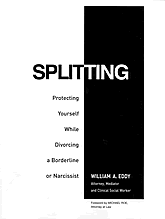In my practice, aside from managing my client’s important cases, I have some role as a “coach” to help my clients manage interactions with a former spouse with BPD, NPD, or traits thereof, that make communications with the former spouse toxic and stressful. My colleague Bill Eddy has introduced the BIFF technique of communications with a toxic ex-spouse: Brief, Informative, Friendly and Firm. See: http://www.highconflictinstitute.com. Also helpful is this article that I found today, that discusses the approach called “Gray Rock.” Akin to BIFF, the idea is to be nonreactive in dealing with the narcissist. In other words, if you have to interact with them, understand that the narcissist feeds on conflict and chaos, and that you, in communicating with them (as you may be forced to do if there are children of the marriage) learn to disempower the NPD’s need for chaos and toxic control.
” If you can’t go “No Contact” with a Narcissist because you have children with them, or you are somehow unable to get them out of your life for whatever reason, you can implement a technique called “Gray Rock”. Gray Rock is where you become as exciting and interesting as, well, a gray rock. The goal is to blend into the background, and become the most boring, unreactive person they’ve ever met. The reason being is that if you can quit being a source of supply for their drama and attention, they will eventually leave you alone.
How to go gray rock?
 Illinois Divorce Lawyer Blog
Illinois Divorce Lawyer Blog




